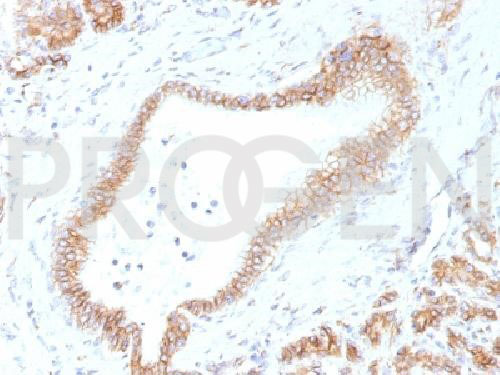anti-p120 (catenin, delta-1 (TNND1; pTyr96)) mouse monoclonal, EBS-CA-011, purified
- Mouse monoclonal
- Suitable for IHC and WB
- Reacts with human, mouse and rat
- Isotype: IgG1 kappa
Product description
| Quantity | 1 ml (100 µg/ml) |
|---|---|
| Antibody Type | Monoclonal |
| Host | Mouse |
| Isotype | IgG1 kappa |
| Conjugate | Unconjugated |
| Application | IHC, WB |
| Purification | Affinity chromatography |
| Reactivity | Human, Mouse, Rat |
| Storage | 2-8°C |
| Intended use | Research use only |
| Clone | EBS-CA-011 |
| Immunogen | Mouse p120 catenin (pY96) |
| Concentration | 100 µg/ml |
| Formulation | PBS with 0.02% sodium azide |
| UniprotID | O60716 (Human), P30999 (Mouse), D3ZZZ9 (Rat) |
| Synonym | Catenin delta-1, Cadherin-associated Src substrate, CAS, p120 catenin, p120(ctn, p120(cas, CTNND1, KIAA0384 |
Applications
| Tested applications | Tested dilutions |
|---|---|
| Immunohistochemistry (IHC) - frozen | 1:50-1:100 (1-2 µg/ml) |
| Western Blot (WB) | 1:50-1:100 (1-2 µg/ml) |
Background
The membrane associated protein pp120 Src substrate (p120 catenin, p120cas) was identified as a tyrosine kinase substrate that is phosphorylated in Src transformed cells or in response to growth factor stimulation. It shares structural similarity with the Drosophila Armadillo protein and the vertebrate beta-catenin and gamma-catenin proteins. Its characteristic Arm domain that is composed of 42-amino acid motif repeats evidences this similarity. In the cell, pl20 catenin is localized to the E-cadherin/catenins cell adhesion complex. Like beta- and gamma-catenin, p120 catenin directly associates with the cytoplasmic C-terminus of E-cadherin via its Arm domain and may similarly interact with other cadherins. It exists as four isoforms that range in size from 90-115 kDa. Expression of these isoforms is heterogeneous in human carcinomas, suggesting that altered pp120 expression contributes to malignancy due to loss of functional cell adhesions. Multiple tyrosine residues (Y96, Y112, Y228, Y280, Y257, Y291, Y296, and Y302) in p120 catenin are phosphorylated by Src and these phosphorylations may facilitate interaction with PTP1C/SHP-1 in response to EGF stimulation. Thus, p120 catenin is an Arm domain protein that interacts with both cell adhesion molecules, such as cadherins and cell signalling molecules, such as PTP1C.
Positive control: carcinoma.
Downloads
Q & A's
Customer Reviews
Login
FAQs
The concentration of purified antibodies is mentioned on the datasheet.
For prediluted antibodies the concentration may vary from lot to lot. The concentration of these antibodies is not mentioned on the datasheet and can be requested at support@progen.com.
The supernatant format contains FCS proteins from cell culture medium supplemented with FCS.
The serum antibodies contain other proteins present in serum.
- Supernatant and supernatant concentrate: This format contains hybridoma cell culture supernatant. The antibody is not purified and the antibody concentration is not determined. The antibody concentration may vary from lot to lot. Therefore we recommend to titrate the optimal concentration for the application used for each new lot.
- Lyophilized, purified: This format contains purified antibody in lyophilized form. The reconstitution of this antibody is described in the datasheet. The buffer composition after reconstitution is also mentioned on the datasheet.
- Liquid, purified: This format contains purified antibody in liquid format. The concentration is mentioned on the datasheet.
- Prediluted, purified: This format contains purified antibody in liquid format. Most antibodies in this format are diluted to be ready-to-use for IHC with standard tissue. But some antibodies of this format need further dilution for IHC. This is mentioned on the datasheet.
Most of our liquid antibodies and reconstituted lyophilized antibodies may be stored for short term storage (up to 3 month) at 2-8°C. For long term storage we recommend to store the antibody at -20°C in aliquots. Please avoid freeze and thaw cycles.
Most of our conjugated antibodies should be stored at 2-8°C.
The individual storage conditions are mentioned on the datasheet.


